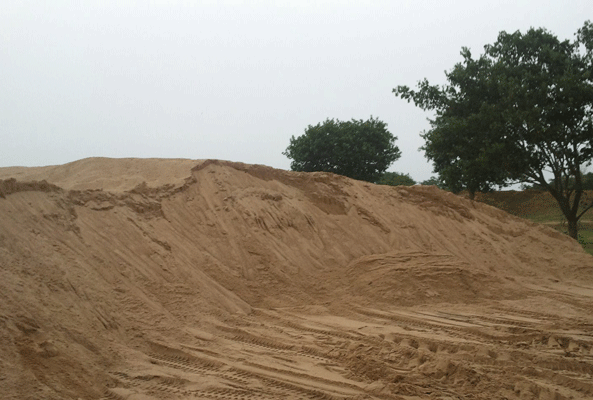
A Chinese-owned company that supplies river sand for the Hwange thermal power station has been accused of causing massive land degradation in surrounding communities with fears of irreversible damage to the environment.
BY NOKUTHABA DLAMINI
Gamba and Chilanga communities say the company is disrupting their way of life.
David Quo supplies the sand to another Chinese-owned firm, Sinohydro, which is behind the US$1,5 billion expansion of the Hwange thermal power station.
Simon Ndlovu, a community leader from Gamba village on the banks of Lukosi River, said the company has left a trail of destruction in the past two years they have been extracting sand.
“They have destroyed the access road that connects us to the main roads and they have not bothered to rehabilitate the damaged sites,” Ndlovu said.
“The company has been extracting river sand in our village for the past two years and they left behind gullies while reeds that used to grow on the river bed are now virtually extinct.”
Mela Shoko, a villager from Chilanga, said David Quo started operating in their area about a fortnight ago and they were apprehensive about the aftermath of the massive sand extraction.
- Chamisa under fire over US$120K donation
- Mavhunga puts DeMbare into Chibuku quarterfinals
- Pension funds bet on Cabora Bassa oilfields
- Councils defy govt fire tender directive
Keep Reading
“They have been here for the past week or so and the destruction that they have caused is too much,” Shoko said.
“We want them to develop our communities as they are also benefiting from our resources, but we don’t see that happening.”
Shoko, who earns a living through basketry, said she was now struggling to get reeds from Lukosi River for her craft.
“I survive on sewing baskets for resale using reeds that grow on wetlands, but the area is now dry because of the sand extraction activities,” she said.
Greater Hwange Residents Association chairperson Fidelis Chima said they were worried about the Chinese firm’s activities, which he said were not environmentally friendly.
According to Chimahe villagers, there is no value in the river sand extraction which they fear will result in the river, which they rely on, being affected.
Ward 20 councillor Bakani Kwidini echoed Chima’s sentiments, saying locals were not benefiting from the sand extraction activities.
“Locals want the extraction to be done in a sustainable manner, and these companies need to give back to the community because Lukosi River is their major source of livelihood,” Kwidini said.
The company has reportedly moved to a new site as the previous site in Gamba village has been heavily damaged and depleted.
Extracting sand involves digging deep down, posing risks for the community who use the river as a source of water for them and their livestock.
“They are also destroying the flora and fauna along that river because it used to be a good source for reeds,” Kwidini added.
Hwange Rural District Council CEO Phindile Ncube reacted angrily to the complaints by community leaders, saying they are misinformed.
“I don’t understand because when unit 7 and 8 [at the Hwange thermal power station] is complete, we are going to produce more and more electricity, so we don’t need distractions,” Ncube said.
“When people want donor funding, they should say so instead of blowing things out of proportion.”
He claimed David Quo was extracting river sand from the Sinamatella area, which does not affect Gamba and Chilanga villages.
“We are only using those areas as abstraction or extraction points.
“People have a tendency of sensationalising things that have nothing to do with development,” Ncube fumed.
Chipo Zuze, the Environmental Management Agency manager in Matabeleland North, said the Chinese company was properly licenced and their activities were actually meant to protect Lukosi River.
Zimbabwe Environmental Law Association (Zela) legal officer Richard Ncube indicated that they were investigating the concerns raised by the Gamba and Chilanga communities.
“We are responding to the calls that we got directly from the residents themselves and their representatives, but so far what we have gathered through our investigations will not be shared with the public,” he said.
“In the event that we find out that they don’t have legal papers to be operating in those areas, we will consider going to court, but in the event that they have them, we still have to look at other issues.”
Two months ago, pressure from Zela and other activists forced the government to ban coal mining activities by two Chinese companies inside Hwange National Park.
Zimbabwe Zhongxin Mining group and Tongmao Coal Mining had been given grants to extract coal, a development activists said posed a threat to the biodiversity of Zimbabwe’s largest game reserve.
l This article was originally published by The Citizen Bulletin, a hyperlocal news outlet covering Covid-19 in Matabeleland.










